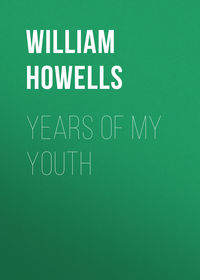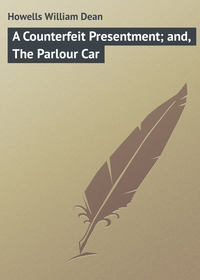 полная версия
полная версияA Boy's Town
I do not know why my boy's associations with Delorac's Island were especially wild in their character, for nothing more like outlawry than the game of mumble-the-peg ever occurred there. Perhaps it was because the boys had to get to it by water that it seemed beyond the bounds of civilization. They might have reached it by the bridge, but the temper of the boys on the western shore was uncertain; they would have had to run the gauntlet of their river-guard on the way up to it; and they might have been friendly or they might not; it would have depended a good deal on the size and number of the interlopers. Besides, it was more glorious to wade across to the island from their side of the river. They undressed and gathered their clothes up into a bundle, which they put on their heads and held there with one hand, while they used the other for swimming, when they came to a place beyond their depth. Then they dressed again, and stretched themselves under the cottonwood-trees and sycamores, and played games and told stories, and longed for a gun to kill the blackbirds which nested in the high tops, and at nightfall made such a clamor in getting to roost that it almost deafened you.
My boy never distinctly knew what formed that island, but as there was a mill there, it must have been made by the mill-race leaving and rejoining the river. It was enough for him to know that the island was there, and that a parrot – a screaming, whistling, and laughing parrot, which was a Pretty Poll, and always Wanted a Cracker – dwelt in a pretty cottage, almost hidden in trees, just below the end of the island. This parrot had the old Creole gentleman living with it who owned the island, and whom it had brought from New Orleans. The boys met him now and then as he walked abroad, with a stick, and his large stomach bowed in front of him. For no reason under the sun they were afraid of him; perhaps they thought he resented their parleys with the parrot. But he and the parrot existed solely to amuse and to frighten them; and on their own side of the river, just opposite the island, there were established some small industries for their entertainment and advantage, on a branch of the Hydraulic. I do not know just what it was they did with a mustard-mill that was there, but the turning-shop supplied them with a deep bed of elastic shavings just under the bank, which they turned somersaults into, when they were not turning them into the river.
I wonder what sign the boys who read this have for challenging or inviting one another to go in swimming. The boys in the Boy's Town used to make the motion of swimming with both arms; or they held up the forefinger and middle-finger in the form of a swallow-tail; they did this when it was necessary to be secret about it, as in school, and when they did not want the whole crowd of boys to come along; and often when they just pretended they did not want some one to know. They really had to be secret at times, for some of the boys were not allowed to go in at all; others were forbidden to go in more than once or twice a day; and as they all had to go in at least three or four times a day, some sort of sign had to be used that was understood among themselves alone. Since this is a true history, I had better own that they nearly all, at one time or other, must have told lies about it, either before or after the fact, some habitually, some only in great extremity. Here and there a boy, like my boy's elder brother, would not tell lies at all, even about going in swimming; but by far the greater number bowed to their hard fate, and told them. They promised that they would not go in, and then they said that they had not been in; but Sin, for which they had made this sacrifice, was apt to betray them. Either they got their shirts on wrong side out in dressing, or else, while they were in, some enemy came upon them and tied their shirts. There are few cruelties which public opinion in the boys' world condemns, but I am glad to remember, to their honor, that there were not many in that Boy's Town who would tie shirts; and I fervently hope that there is no boy now living who would do it. As the crime is probably extinct, I will say that in those wicked days, if you were such a miscreant, and there was some boy you hated, you stole up and tied the hardest kind of a knot in one arm or both arms of his shirt. Then, if the Evil One put it into your heart, you soaked the knot in water, and pounded it with a stone.
I am glad to know that in the days when he was thoughtless and senseless enough, my boy never was guilty of any degree of this meanness. It was his brother, I suppose, who taught him to abhor it; and perhaps it was his own suffering from it in part; for he, too, sometimes shed bitter tears over such a knot, as I have seen hapless little wretches do, tearing at it with their nails and gnawing at it with their teeth, knowing that the time was passing when they could hope to hide the fact that they had been in swimming, and foreseeing no remedy but to cut off the sleeve above the knot, or else put on their clothes without the shirt, and trust to untying the knot when it got dry.
There must have been a lurking anxiety in all the boys' hearts when they went in without leave, or, as my boy was apt to do, when explicitly forbidden. He was not apt at lying, I dare say, and so he took the course of open disobedience. He could not see the danger that filled the home hearts with fear for him, and he must have often broken the law and been forgiven, before Justice one day appeared for him on the river-bank and called him away from his stolen joys. It was an awful moment, and it covered him with shame before his mates, who heartlessly rejoiced, as children do, in the doom which they are escaping. That sin, at least, he fully expiated; and I will whisper to the Young People here at the end of the chapter, that somehow, soon or late, our sins do overtake us, and insist upon being paid for. That is not the best reason for not sinning, but it is well to know it, and to believe it in our acts as well as our thoughts. You will find people to tell you that things only happen so and so. It may be; only, I know that no good thing ever happened to happen to me when I had done wrong.
IV.
THE CANAL AND ITS BASIN
The canal came from Lake Erie, two hundred miles to the northward, and joined the Ohio River twenty miles south of the Boy's Town. For a time my boy's father was collector of tolls on it, but even when he was old enough to understand that his father held this State office (the canal belonged to the State) because he had been such a good Whig, and published the Whig newspaper, he could not grasp the notion of the distance which the canal-boats came out of and went into. He saw them come and he saw them go; he did not ask whence or whither; his wonder, if he had any about them, did not go beyond the second lock. It was hard enough to get it to the head of the Basin, which left the canal half a mile or so to the eastward, and stretched down into the town, a sheet of smooth water, fifteen or twenty feet deep, and a hundred wide; his sense ached with, the effort of conceiving of the other side of it. The Basin was bordered on either side near the end by pork-houses, where the pork was cut up and packed, and then lay in long rows of barrels on the banks, with other long rows of salt-barrels, and yet other long rows of whiskey-barrels; cooper-shops, where the barrels were made, alternated with the pork-houses. The boats brought the salt and carried away the pork and whiskey; but the boy's practical knowledge of them was that they lay there for the boys to dive off of when they went in swimming, and to fish under. The water made a soft tuck-tucking at the sterns of the boat, and you could catch sunfish, if you were the right kind of a boy, or the wrong kind; the luck seemed to go a good deal with boys who were not good for much else. Some of the boats were open their whole length, with a little cabin at the stern, and these pretended to be for carrying wood and stone, but really again were for the use of the boys after a hard rain, when they held a good deal of water, and you could pole yourself up and down on the loose planks in them. The boys formed the notion at times that some of these boats were abandoned by their owners, and they were apt to be surprised by their sudden return. A feeling of transgression was mixed up with the joys of this kind of navigation; perhaps some of the boys were forbidden it. No limit was placed on their swimming in the Basin, except that of the law which prohibited it in the daytime, as the Basin was quite in the heart of the town. In the warm summer nights of that southerly latitude, the water swarmed with laughing, shouting, screaming boys, who plunged from the banks and rioted in the delicious water, diving and ducking, flying and following, safe in the art of swimming which all of them knew. They turned somersaults from the decks of the canal-boats; some of the boys could turn double somersaults, and one boy got so far as to turn a somersault and a half; it was long before the time of electric lighting, but when he struck the water there came a flash that seemed to illumine the universe.
I am afraid that the Young People will think I am telling them too much about swimming. But in the Boy's Town the boys really led a kind of amphibious life, and as long as the long summer lasted they were almost as much in the water as on the land. The Basin, however, unlike the river, had a winter as well as a summer climate, and one of the very first things that my boy could remember was being on the ice there, when a young man caught him up into his arms, and skated off with him almost as far away as the canal. He remembered the fearful joy of the adventure, and the pride, too; for he had somehow the notion that this young fellow was handsome and fine, and did him an honor by his notice – so soon does some dim notion of worldly splendor turn us into snobs! The next thing was his own attempt at skating, when he was set down from the bank by his brother, full of a vainglorious confidence in his powers, and appeared instantly to strike on the top of his head. Afterwards he learned to skate, but he did not know when, any more than he knew just the moment of learning to read or to swim. He became passionately fond of skating, and kept at it all day long when there was ice for it, which was not often in those soft winters. They made a very little ice go a long way in the Boy's Town; and began to use it for skating as soon as there was a glazing of it on the Basin. None of them ever got drowned there; though a boy would often start from one bank and go flying to the other, trusting his speed to save him, while the thin sheet sank and swayed, but never actually broke under him. Usually the ice was not thick enough to have a fire built on it; and it must have been on ice which was just strong enough to bear that my boy skated all one bitter afternoon at Old River, without a fire to warm by. At first his feet were very cold, and then they gradually felt less cold, and at last he did not feel them at all. He thought this very nice, and he told one of the big boys. "Why, your feet are frozen!" said the big boy, and he dragged off my boy's skates, and the little one ran all the long mile home, crazed with terror, and not knowing what moment his feet might drop off there in the road. His mother plunged them in a bowl of ice-cold water, and then rubbed them with flannel, and so thawed them out; but that could not save him from the pain of their coming to: it was intense, and there must have been a time afterwards when he did not use his feet.
His skates themselves were of a sort that I am afraid boys would smile at nowadays. When you went to get a pair of skates forty or fifty years ago, you did not make your choice between a Barney & Berry and an Acme, which fastened on with the turn of a screw or the twist of a clamp. You found an assortment of big and little sizes of solid wood bodies with guttered blades turning up in front with a sharp point, or perhaps curling over above the toe. In this case they sometimes ended in an acorn; if this acorn was of brass, it transfigured the boy who wore that skate; he might have been otherwise all rags and patches, but the brass acorn made him splendid from head to foot. When you had bought your skates, you took them to a carpenter, and stood awe-strickenly about while he pierced the wood with strap-holes; or else you managed to bore them through with a hot iron yourself. Then you took them to a saddler, and got him to make straps for them; that is, if you were rich, and your father let you have a quarter to pay for the job. If not, you put strings through, and tied your skates on. They were always coming off, or getting crosswise of your foot, or feeble-mindedly slumping down on one side of the wood; but it did not matter, if you had a fire on the ice, fed with old barrels and boards and cooper's shavings, and could sit round it with your skates on, and talk and tell stories, between your flights and races afar; and come whizzing back to it from the frozen distance, and glide, with one foot lifted, almost among the embers.
Beyond the pork-houses, and up farther towards the canal, there were some houses under the Basin banks. They were good places for the fever-and-ague which people had in those days without knowing it was malaria, or suffering it to interfere much with the pleasure and business of life; but they seemed to my boy bowers of delight, especially one where there was a bear, chained to a weeping-willow, and another where there was a fishpond with gold-fish in it. He expected this bear to get loose and eat him, but that could not spoil his pleasure in seeing the bear stand on his hind-legs and open his red mouth, as I have seen bears do when you wound them up by a keyhole in the side. In fact, a toy bear is very much like a real bear, and safer to have round. The boys were always wanting to go and look at this bear, but he was not so exciting as the daily arrival of the Dayton packet. To my boy's young vision this craft was of such incomparable lightness and grace as no yacht of Mr. Burgess's could rival. When she came in of a summer evening her deck was thronged with people, and the captain stood with his right foot on the spring-catch that held the tow-rope. The water curled away on either side of her sharp prow, that cut its way onward at the full rate of five miles an hour, and the team came swinging down the tow-path at a gallant trot, the driver sitting the hindmost horse of three, and cracking his long-lashed whip with loud explosions, as he whirled its snaky spirals in the air. All the boys in town were there, meekly proud to be ordered out of his way, to break and fly before his volleyed oaths and far before his horses' feet; and suddenly the captain pressed his foot on the spring and released the tow-rope. The driver kept on to the stable with unslackened speed, and the line followed him, swishing and skating over the water, while the steersman put his helm hard aport, and the packet rounded to, and swam softly and slowly up to her moorings. No steamer arrives from Europe now with such thrilling majesty.
The canal-boatmen were all an heroic race, and the boys humbly hoped that some day, if they proved worthy, they might grow up to be drivers; not indeed packet-drivers; they were not so conceited as that; but freight-boat drivers, of two horses, perhaps, but gladly of one. High or low, the drivers had a great deal of leisure, which commended their calling to the boyish fancy; and my boy saw them, with a longing to speak to them, even to approach them, never satisfied, while they amused the long summer afternoon in the shade of the tavern by a game of skill peculiar to them. They put a tack into a whiplash, and then, whirling it round and round, drove it to the head in a target marked out on the weather-boarding. Some of them had a perfect aim; and in fact it was a very pretty feat, and well worth seeing.
Another feat, which the pioneers of the region had probably learned from the Indians, was throwing the axe. The thrower caught the axe by the end of the helve, and with a dextrous twirl sent it flying through the air, and struck its edge into whatever object he aimed at – usually a tree. Two of the Basin loafers were brothers, and they were always quarrelling and often fighting. One was of the unhappy fraternity of town-drunkards, and somehow the boys thought him a finer fellow than the other, whom somehow they considered "mean," and they were always of his side in their controversies. One afternoon these brothers quarrelled a long time, and then the sober brother retired to the doorway of a pork-house, where he stood, probably brooding upon his injuries, when the drunkard, who had remained near the tavern, suddenly caught up an axe and flung it; the boys saw it sail across the corner of the Basin, and strike in the door just above his brother's head. This one did not lose an instant; while the axe still quivered in the wood, he hurled himself upon the drunkard, and did that justice on him which he would not ask from the law, perhaps because it was a family affair; perhaps because those wretched men were no more under the law than the boys were.
I do not mean that there was no law for the boys, for it was manifest to their terror in two officers whom they knew as constables, and who may have reigned one after another, or together, with full power of life and death over them, as they felt; but who in a community mainly so peaceful acted upon Dogberry's advice, and made and meddled with rogues as little as they could. From time to time it was known among the boys that you would be taken up if you went in swimming inside of the corporation line, and for a while they would be careful to keep beyond it; but this could not last; they were soon back in the old places, and I suppose no arrests were ever really made. They did, indeed, hear once that Old Griffin, as they called him, caught a certain boy in the river before dark, and carried him up through the town to his own home naked. Of course no such thing ever happened; but the boys believed it, and it froze my boy's soul with fear; all the more because this constable was a cabinet-maker and made coffins; from his father's printing-office the boy could hear the long slide of his plane over the wood, and he could smell the varnish on the boards.
I dare say Old Griffin was a kindly man enough, and not very old; and I suppose that the other constable, as known to his family and friends, was not at all the gloomy headsman he appeared to the boys. When he became constable (they had not the least notion how a man became constable) they heard that his rule was to be marked by unwonted severity against the crime of going in swimming inside the corporation line, and so they kept strictly to the letter of the law. But one day some of them found themselves in the water beyond the First Lock, when the constable appeared on the tow-path, suddenly, as if he and his horse had come up out of the ground. He told them that he had got them now, and he ordered them to come along with him; he remained there amusing himself with their tears, their prayers, and then vanished again. Heaven knows how they lived through it; but they must have got safely home in the usual way, and life must have gone on as before. No doubt the man did not realize the torture he put them to; but it was a cruel thing; and I never have any patience with people who exaggerate a child's offence to it, and make it feel itself a wicked criminal for some little act of scarcely any consequence. If we elders stand here in the place of the Heavenly Father towards those younger children of His, He will not hold us guiltless when we obscure for them the important difference between a great and a small misdeed, or wring their souls, fear-clouded as they always are, with a sense of perdition for no real sin.
V.
THE HYDRAULIC AND ITS RESERVOIRS. – OLD RIVER
There were two branches of the Hydraulic: one followed the course of the Miami, from some unknown point to the northward, on the level of its high bank, and joined the other where it emptied into the river just above the bridge. This last came down what had been a street, and it must have been very pretty to have these two swift streams of clear water rushing through the little town, under the culverts, and between the stone walls of its banks. But what a boy mainly cares for in a thing is use, and the boys tried to make some use of the Hydraulic, since it was there to find what they could do with it. Of course they were aware of the mills dotted along its course, and they knew that it ran them; but I do not believe any of them thought that it was built merely to run flour-mills and saw-mills and cotton-mills. They did what they could to find out its real use, but they could make very little of it. The current was so rapid that it would not freeze in winter, and in summer they could not go in swimming in it by day, because it was so public, and at night the Basin had more attractions. There was danger of cutting your feet on the broken glass and crockery which people threw into the Hydraulic, and though the edges of the culverts were good for jumping off of, the boys did not find them of much practical value. Sometimes you could catch sunfish in the Hydraulic, but it was generally too swift, and the only thing you could depend upon was catching crawfish. These abounded so that if you dropped a string with a bit of meat on it into the water anywhere, you could pull it up again with two or three crawfish hanging to it. The boys could not begin to use them all for bait, which was the only use their Creator seemed to have designed them for; but they had vaguely understood that people somewhere ate them, or something like them, though they had never known even the name of lobsters; and they always intended to get their mothers to have them cooked for them. None of them ever did.
They could sometimes, under high favor of fortune, push a dog into the Hydraulic, or get him to jump in after a stick; and then have the excitement of following him from one culvert to another, till he found a foothold and scrambled out. Once my boy saw a chicken cock sailing serenely down the currant; he was told that he had been given brandy, and that brandy would enable a chicken to swim; but probably this was not true. Another time, a tremendous time, a boy was standing at the brink of a culvert, when one of his mates dared another to push him in. In those days the boys attached peculiar ideas of dishonor to taking a dare. They said, and in some sort they believed, that a boy who would take a dare would steal sheep. I do not now see why this should follow. In this case, the high spirit who was challenged felt nothing base in running up behind his unsuspecting friend and popping him into the water, and I have no doubt the victim considered the affair in the right light when he found that it was a dare. He drifted under the culvert, and when he came out he swiftly scaled the wall below, and took after the boy who had pushed him in; of course this one had the start. No great harm was done; everybody could swim, and a boy's summer costume in that hot climate was made up of a shirt and trousers and a straw hat; no boy who had any regard for his social standing wore shoes or stockings, and as they were all pretty proud, they all went barefoot from April till October.
The custom of going barefoot must have come from the South, where it used to be so common, and also from the primitive pioneer times which were so near my boy's time, fifty years ago. The South characterized the thinking and feeling of the Boy's Town, far more than the North. Most of the people were of Southern extraction, from Kentucky or Virginia, when they were not from Pennsylvania or New Jersey. There might have been other New England families, but the boys only knew of one – that of the blacksmith whose shop they liked to haunt. His children were heard to dispute about an animal they had seen, and one of them said, "Tell ye 'twa'n't a squeerrel; 'twas a maouse;" and the boys had that for a by-word. They despised Yankees as a mean-spirited race, who were stingy and would cheat; and would not hit you if you told them they lied. A person must always hit a person who told him he lied; but even if you called a Yankee a fighting liar (the worst form of this insult), he would not hit you, but just call you a liar back. My boy long accepted these ideas of New England as truly representative of the sectional character. Perhaps they were as fair as some ideas of the West which he afterwards found entertained in New England; but they were false and stupid all the same.









